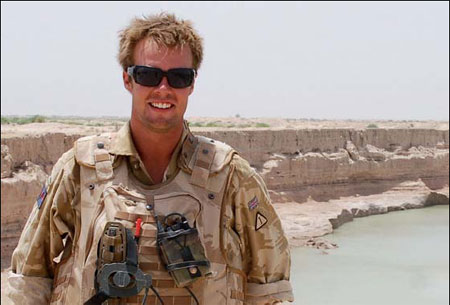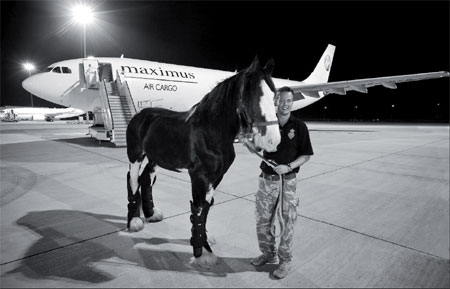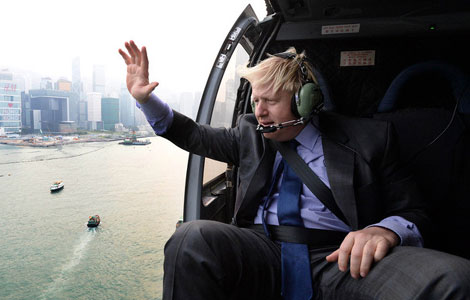Hobby horses of the rich and famous
Updated: 2013-10-18 09:46
By Mark Graham (China Daily Europe)
|
|||||||||||
|
Olver has fought in wars but now his attention is mostly on the super-rich in China who love to show their social status at polo games. Provided to China Daily |
Plans are afoot to introduce polo to various parts of China
Ed Olver has commanded troops in war zones and ridden ceremonial horses down The Mall in London. Now he has grand plans for China. The former army and Household Cavalry officer is co-founder of British Polo Day, which has an annual competition at a club outside Beijing near the Great Wall, and he is now contemplating staging polo events elsewhere in China, most likely mini-versions that can be staged in mobile arenas.
Olver, who was once also a day trader, is nothing if not ambitious. British Polo Day started with a global remit, the idea being to hold invitation-only polo events in Argentina, China, India, the Middle East and Singapore and luring rich spectators.
Sponsors, particularly British heritage brands, loved the idea, a chance for them to peddle their wares to the rich. The game, popular among the mega-rich, aristocracy and royalty, is usually spread over an afternoon, allowing ample time for spectators to network over drinks and lunch.
The third British Polo Day in China will be held on October 19 at the Sunny Times polo club, the one outside Beijing near the Great Wall. The club owner, Xia Yang, is an accomplished player and a participant in the event.
"Britain is the place that founded modern polo and China is the place where it originated," says Xia, who has laid a new pitch for this year's event. "British Polo Day provides good opportunities for people from overseas to come together with China. It is an exciting sporting event and provides business opportunities."
At the event, teams made up of players from Argentina, China, England and New Zealand battle it out on the field, while spectators nibble sandwiches, sip champagne and hobnob with other movers and shakers.
"Among the elite, the position that polo has means that money is keen to come into it, says Olver, 32. "It's a big-face thing. If you have a polo team it is about status, and Chinese society is so about status that I think the future of polo is really, really bright.
"There is also an understanding that this is a Chinese sport. There is great imagery from the Tang Dynasty (AD 618-907) of polo being played. That is a positive link and generates national pride.
"If you look at all the different brands, the horse is often involved. It is such a symbolic part of elitism, because to own a horse in China, with the scarcity of space, you have to be seriously wealthy."
The event certainly has no trouble luring high-end sponsors such as Land Rover.
"We are proud to support polo in China and excited to be advocating a British sport here," says Bob Grace, president of Jaguar Land Rover China. "Polo is a game traditionally played in Britain by a successful, and sometimes royal, crowd and we wanted to reinforce our brand's British lineage and regal connection.
"It is also a sport that you often associate with luxury."
Another sponsor, Piaget of Switzerland, has signed up for similar reasons. Executive Thomas Bouillonnec says the event is a great way to publicize the watch brand and to treat clients to a beautiful day out.
For a trained soldier like Olver, used to moving troops around in tricky situations, organizing a peacetime polo event is relatively straightforward. He spent many years with the Household Cavalry, the regiment that provides a mounted guard for Britain's Queen Elizabeth on ceremonial occasions. When the soldiers perform the daily changing of the guard at Buckingham Palace, onlookers gather to admire the slickly groomed horses and grandly attired soldiers, who sport metal breastplates and plumed helmets.
Olver says that when he was on desert patrol in Iraq, dodging mortar bombs and engaging in firefights was an almost daily occurrence.
The army gave him invaluable organizational skills and contacts that have allowed British Polo Day to operate seamlessly across different continents, he says. As well as the major annual event near Beijing, he is considering putting on exhibition games in smaller cities.
"The idea would be to do a British polo series, build an arena from scratch in the second- and third-tier cities and create something very special. The game would be held on a sand surface, with a bigger ball. It allows people to get a taste of polo, a kind of showcase. It is an exciting prospect."
The organizing company will also broaden its reach, capitalizing on its association with Britishness, Olver says. The idea is to offer other services that play on Britain's strong points, including its private schooling, sought-after London housing, strong legal tradition and respected financial institutions.
"I see us taking the best capital to the best opportunities and the best opportunities to the best capital. We don't want to operate in gray areas. In Britain we are world famous for quality. My regiment, for example, still uses steel breastplates whereas other presidential guards use aluminum.
"I think Britain is a trusted source with quality values. We are known as being very straight and very respectable, with a seriously good grasp on craft and luxury."
Britons are not very good at "shouting about ourselves", he says. "They are more reticent and private."
Olver says he better appreciates the country's strengths having grown up as an expatriate in Hong Kong, where his father, Jake Olver, held various positions with the Swire group. Olver junior went to university in Britain and worked as a city trader in London, and for a marketing company, before joining the army.
His current existence is peripatetic, circling the globe to organize British Polo Day events, and sweet-talk potential sponsors. It involves meeting some of the world's wealthiest people.
"We work with 70 independent billionaires and 12 royal families around the world. I think what gets interesting is we are being presented the whole time with business opportunities."
Contact the writer at mrgraham@netvigator.com
For China Daily
|
Ed Olver realizes that a horse is a symbol of success and elitism in China, because the population is so dense and to own a horse requires huge space. Provided to China Daily |
(China Daily European Weekly 10/18/2013 page28)
Today's Top News
Beijing works to spur global development
Scientists requested government to plant GM crops
Travelers to Europe bypass attractions of Brussels
China is reaching its tipping point
Li urges greater effort on reforms
'Constructive ideas' on thorny issues needed
US deal key to nabbing fugitives
JPMorgan, DOJ reaches $13b deal
Hot Topics
Lunar probe , China growth forecasts, Emission rules get tougher, China seen through 'colored lens', International board,
Editor's Picks

|

|

|

|

|

|







